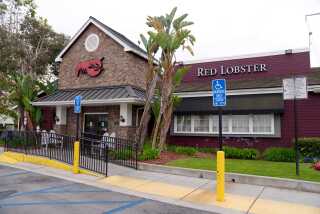Carl Karcher Fighting His Battle on 2 Fronts : Debt: Behind his struggle to regain control of Carl’s Jr. are financial problems stemming from a troubled real estate deal.
- Share via
ANAHEIM — Lurking behind hamburger magnate Carl N. Karcher’s battle to regain control of the fast-food chain he founded are personal financial difficulties rooted in Southern California’s dismal real estate market.
Karcher, 76, has said little about his finances other than that he has defaulted on $30 million in personal bank loans on his investments and might be forced to sell some of his 6.1 million shares in Carl Karcher Enterprises Inc., the Anaheim-based parent of the Carl’s Jr. chain, to handle these defaults.
Some of Karcher’s problems are linked to a small firm developing single-family homes throughout the Inland Empire. Court files in San Bernardino show that Karcher was a partner and investor in the company, which, like big-time developers, has been stung by a declining demand for new homes and falling prices.
The company, Monnig Development Inc., has built about 1,700 entry-level homes in the Inland Empire since the late 1970s, including about 1,000 in which Karcher was an investor, according to founder Maurice Monnig, a longtime Karcher acquaintance.
In July, a Superior Court judge agreed to Karcher’s request that Monnig be replaced by a court-appointed receiver.
Closer to home, Karcher has also pumped his own money into an apartment project that was designed to restore the blighted Chevy Chase neighborhood near Carl Karcher Enterprises’ corporate headquarters. Financing for the project included $20 million in tax-exempt bonds issued by the city’s redevelopment agency.
Karcher and a partner invested in the project to make it a “showcase as far as what you can do to revitalize the neighborhood,” Karcher spokesman Edward Pasquale said.
Rand Sperry, a partner with Newport Beach brokerage Sperry Van Ness, said, “Karcher went in there and basically did a major renovation, spending a lot of money on it.”
The value of Karcher’s investment in Carl Karcher Enterprises--34% of the company’s stock-- has also been hurt by lackluster fast-food sales.
A sale of shares now would be a disadvantage to Karcher, despite his other investment problems.
The company’s management thinks it can boost share prices by trimming costs and attracting more customers with a new, “value-oriented” menu.
For Karcher, who also serves as chairman but has no operational control, management’s plan is too little too late. Karcher has threatened a proxy fight to regain control over the company and set in motion a marketing plan that he said will boost the value of his holdings.
The major financial problem facing Karcher is “the value of Carl Karcher Enterprises stock,” Pasquale said. “If the value of that stock improves, it helps not only Carl, but every other shareholder.”
Karcher threatened the proxy fight after board members rejected his proposal to test-market Anaheim-based GB Foods’ Mexican-style products at several Carl’s Jr. locations. Karcher said the GB Foods alliance would improve flagging sales and profit.
Several company directors maintain that Karcher wants the GB Foods test because, as part of the deal, he would get financial help from GB Foods Chairman William Theisen. Karcher’s spokesmen have said there would be no strings attached.
Times correspondent Terry Spencer contributed to this report.
More to Read
Inside the business of entertainment
The Wide Shot brings you news, analysis and insights on everything from streaming wars to production — and what it all means for the future.
You may occasionally receive promotional content from the Los Angeles Times.










